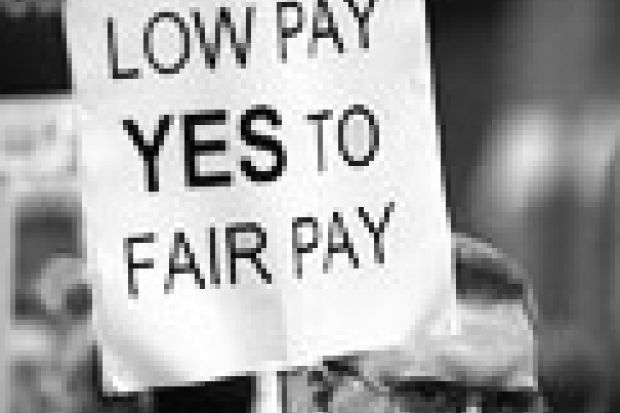Local pay bargaining in higher education came a step closer this week after the Association of University Teachers exposed moves by elite institutions to abandon the national negotiating structure.
In a briefing paper, seen by The THES , the AUT told its local leaders that a group of research"led universities - represented by the Russell Group and the 94 Group - will break away from the national pay system and form a bargaining "cartel". The split, which may include one or two "aspirant" new universities, could happen in about a year, the paper says.
Soundings taken by The THES from vice"chancellors, their representatives and university personnel professionals back the AUT claims. They confirm divisions within the sector over the future of the Universities and Colleges Employers Association, which negotiates pay nationally on behalf of its member institutions.
The AUT paper says: "The Russell Group has started preparations for consortium bargaining. This grouping... seems unimpressed with the wish of in new universities (with a few exceptions) to try to hold a minimalist national scheme together. In addition, they are seriously split on the role of student fees in the provision of funding."
The AUT said that the opposition of the Russell and the 94 groups to national bargaining over conditions "is a serviceable tactic for breaking up the national bargaining system at a moment of their choosing". The paper says that, while vice"chancellors are loath to admit their intentions, the AUT must be ready for any such moves.
The union therefore is planning for full consultation on new pay determination systems. This will include debates over local pay determination and plans for bargaining with consortia of universities based on their institutional profiles.
AUT general secretary David Triesman described the present system run by the UCEA as "a busted flush". He said: "I believe that only one year in the past half dozen have we got an award that was at or above the median of what institutions could afford. Roughly, among pre"1992 universities, about three"quarters budgeted to pay more than this year's 3 per cent pay rise."
Mr Triesman has said he would prefer to keep a national system. But his paper to local union leaders has already provoked a backlash from members. Two local branches have submitted motions to next week's winter council condemning Mr Triesman for undermining the national structure.
The UCEA board was due to meet yesterday to discuss the dispute over next year's pay offer. The dispute has led to industrial action by all higher education unions except the AUT.
Peter Humphreys, chief executive of the UCEA, said that the board would review its position. He refused to say whether this meant the UCEA would come back to the negotiating table on pay for next year, but the unions were optimistic.
Mr Humphreys said he was not aware of any moves by any universities to split from the association.
Tom Wilson, head of universities for lecturers' union Natfhe, said: "It is not exactly helpful for the AUT to rubbish the UCEA and national bargaining at precisely the time all other higher education unions are taking action to try to maintain national bargaining. Of course we won't always like what the UCEA says, but without a national employers' body there will be no national bargaining, and local unions will be isolated and weakened."
A source at Universities UK, formerly the Committee of Vice"Chancellors and Principals, said: "There is continuing controversy about the future of pay bargaining arrangements although it is essential that a way forward is found to resolve the big structural issues."
Sir Graeme Davies, principal of Glasgow University, said: "The UCEA has to make a very strong case for its continued existence. If there was to be fragmentation on pay bargaining, the question is where would the fragmentation occur? Would it be along funding council lines or along lines of institutional affinity?"
Graham Upton, vice"chancellor of the post"1992 Oxford Brookes University, said: "I would certainly support changes that brought a greater level of local negotiation not just into pay but into terms and conditions. I feel very strongly that local negotiations will allow us more freedom."
Peter Deer, director of personnel at Cambridge University, said: "There is clearly a trend towards doing such negotiations locally. There is a future for the UCEA provided it reflects institutions' needs."
Roderick Floud, provost of London Guildhall University and president elect of UUK, said: "There is clearly unhappiness about the state of negotiations within the sector and the bargaining arrangements. But I do not think there is a consensus on any radical changes."
Register to continue
Why register?
- Registration is free and only takes a moment
- Once registered, you can read 3 articles a month
- Sign up for our newsletter
Subscribe
Or subscribe for unlimited access to:
- Unlimited access to news, views, insights & reviews
- Digital editions
- Digital access to THE’s university and college rankings analysis
Already registered or a current subscriber?
